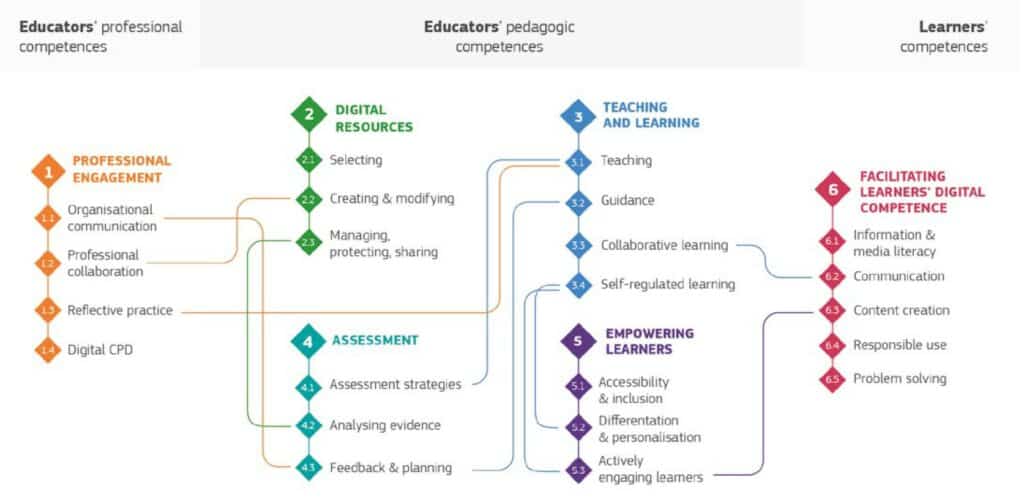Digital competence involves the confidence, critical and responsive use of and engagement with digital technologies for learning, work, and participation in society. It should be at the heart of educational development in European schools but European school Luxembourg 2 fails miserably in this area too.
Table of Contents
Digital competence, what is it?
Digital competence includes information and data literacy, communication and collaboration, digital content creation (including programming), safety, (including digital well-being and competencies relating to cyber security), and problem-solving.
Based on the document 2018-09D-69 of Office of the secretary-general of European school it should already be implemented in all the European schools. It’s included with other key competencies for lifelong learning in the Framework for Key Competences in the European Schools. The document states that European schools put the competencies in the syllabus but implementation is incoherent and inconsistent.
Areas of digital competence
The document specifies the following areas:
Essential Knowledge:
- how digital technologies can support communication, creativity and innovation,
- the opportunities, limitations, effects and risks associated with digital technologies
- the general principles, mechanisms and logic underlying evolving digital technologies
- the basic use and function of different devices, software and networks
- validity, reliability and impact of information and data made available by digital means
- Legal and ethical principles involved in engaging with digital technologies
Core skills
- access, use, filter, process and evaluate digital content
- create, program and share digital content
- manage and protect information, content, data and digital identities
- use digital tools to produce, present and understand complex information
- recognise and effectively engage with: software and devices, artificial intelligence and robots
- use digital technology to support their creativity and to collaborate with others towards personal, social or commercial goals
Attitudes
- applying a reflective and critical thinking approach
- being curious, open-minded and forward-looking
- using an ethical, safe and responsible approach to the use of digital content and tools
- engaging in communities and networks for cultural, social and/or professional purposes
Level of digital competence in Mamer school
Is VEEEEERY low. Although the document is nicely written and provides good basic, the school administration doesn’t bother to provide tools for teachers and students. Here are some examples:
Wi-Fi is not allowed in the Primary building. Therefore, the teacher can’t use mobile devices for classroom teaching. If teachers wish to present a mobile application and how it works, they have to use a personal mobile network and pay personally from their pocket. If a teacher would like to practice with children on mobile devices this is not an option.
School is blocking access to many websites that supports education. They are doing this because it’s an easy way. As many incompetent IT managers are doing, you block everything, and allow (or not) one by one. It takes ages, and a lot of personal involvement of teachers if they wish to use digital content during classes.
IT equipment is archaic. PCs are so old that they are unusable. They don’t work, so ICT classes are not possible, or multiple students have to share one device. For years now, teachers have had to bring their personal equipment (laptops, speakers…) so they can run simple PowerPoint presentations in the classrooms.
IT support is laggy. It takes a lot of time and energy to get any help, and you’re not even sure you will get any. In the end, you give up and try to find a solution for yourself—typical bureaucratic behavior. You create so many obstacles people give up, although IT support is paid for their work.
Outdated operating system: school used Windows 7 operating system until September 2021, even is Microsoft ended official support on 14.01.2020. That means there were no bug fixes, and the whole school IT system was exposed to hacks because of that. They upgraded to Windows 10 in September 2021. Microsoft will stop supporting this version in one year (13.12.2022).
European framework for the digital competence of educators
The European Framework for the Digital Competence of Educators (DigCompEdu) responds to the growing awareness among the many European Member States that educators need a set of digital competencies specific to their profession in order to be able to seize the potential of digital technologies for enhancing and innovating education.
Indeed pedagogical staff and administration should lean too. That is why the European commission prepared DigCompEdu Framework. Their model allows educators at all levels of education to comprehensively assess and develop their pedagogical digital competence.

The focus for educators should be on the following aspects:
- Professional Engagement: Using digital technologies for communication, collaboration and professional development.
- Digital Resources: Sourcing, creating and sharing digital resources
- Teaching and Learning: Managing and orchestrating the use of digital technologies in teaching and learning.
- Assessment: Using digital technologies and strategies to enhance assessment.
- Empowering Learners: Using digital technologies to enhance inclusion, personalisation and learners’ active engagement
- Facilitating Learners’ Digital Competence: Enabling learners to creatively and responsibly use digital technologies for information, communication, content creation, wellbeing and problem-solving.